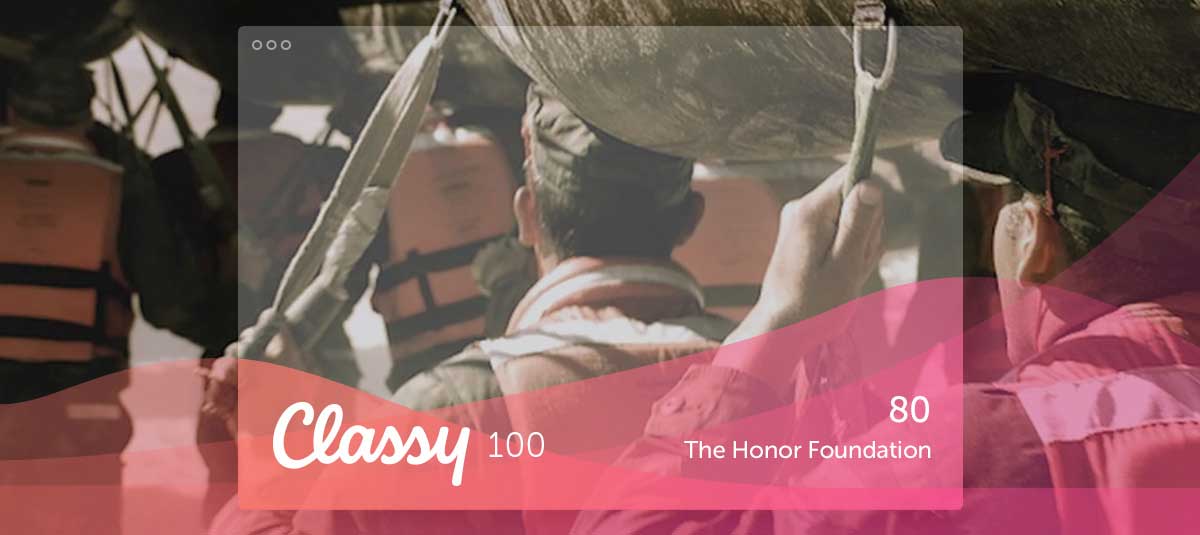14 Nonprofit Management Tips for a Growth Mindset

Request a Demo
Learn how top nonprofits use Classy to power their fundraising.
This is the third post in a series chronicling The Honor Foundation’s growth. We’ll continue to check in with founder and CEO Joe Musselman to learn about the strategies that work well for them and set them up for future success. Previously, we’ve discussed how birthday campaigns launched their success and the importance of a website redesign.
While an increasing number of educational institutes are developing nonprofit management programs to better equip the social leaders of tomorrow, the industry lacks the formal golden path of many other fields that sets leaders on a trajectory of success.
This is why, for the social impact space, collaboration and the sharing of best practices are so fundamental to nonprofit growth and learning. To help your organization implement strategies that accelerate meaningful growth, we sat down with The Honor Foundation’s CEO and founder Joe Musselman. His organization’s exemplary year-over-year growth is the sum of many key components—perhaps most fundamentally, Musselman’s unique and effective leadership and management strategies.
Hear his take in the video clips below for inspiration and to gut-check your own approach to leadership.
On Founding a Nonprofit
You Have to Be Obsessed
https://classy.wistia.com/medias/t3pamh95zb?embedType=async&videoFoam=true&videoWidth=640To start an organization takes focus and dedication. But according to Joe, when it “becomes really hard very fast—you need more than passion to get you through what you’re trying to solve as a serious social problem.”
Successful founders become fixated on building their expertise so they can solve problems. This full understanding of the issue and possible solutions is not only what differentiates you, but also what carries you forward.
You Must Have Fierce Empathy
https://classy.wistia.com/medias/yf6imjk6mv?embedType=async&videoFoam=true&videoWidth=640Whether you set up countless meetings with the people in your neighborhood, or fly across the globe to engage with your beneficiaries, it’s critical that you meet the people you serve in order to understand their needs and address them effectively.
It’s this deep desire to understand that will lead you to empathize and present a fitting social solution.
Don’t Ever Lose Your Roots
https://classy.wistia.com/medias/zbdw1nw731?embedType=async&videoFoam=true&videoWidth=640When you’re starting an organization, Joe points out that you’re the only person who has experience in every role. Yet, it’s necessary to “fire yourself” as you grow and expand. Over time, you move away from emotion-driven founding moments, and you begin to hand off areas of the business to new team members.
To keep the founding fire alive no matter what you transition to, find ways to continue to connect to the mission. Whether it’s chatting with beneficiaries or setting time aside to personally thank your supporters, commit to whatever you need to fuel the flame.
The Worst Word in Your Dictionary is “Yes”
According to Joe, founders tend to be people pleasers. When an organization is in its infancy, it can be easy to invite a lot of cooks into the kitchen, who all advise unique trajectories and investments.
In order to preserve the integrity and health of a new organization, you need to learn how to politely say “thanks, but no thanks.” Or even, “thanks, but not at this time.” When you hone in on a clear focus and specialization, you are in a better position to grow and scale. Saying “no” now means you’ll be around to consider saying “yes” later.
On Building an Effective Team
Founding Employees Should Not Be From Your Space
https://classy.wistia.com/medias/8o8pbgctat?embedType=async&videoFoam=true&videoWidth=640In Joe’s words, “when you’re starting something new, you want everything to be new.” Not only did he have no previous nonprofit experience when he created The Honor Foundation, but also his first employee was from a bio technology device company, with “no nonprofit experience whatsoever.” And it was no coincidence.
In order to think creatively, you—and the people you surround yourself with—need to approach longstanding social problems with fresh eyes. This assembly of different perspectives allows your team to be inventive and push the boundaries of industry standards.
The First Rule in Hiring Is Don’t Hire
https://classy.wistia.com/medias/161gxj51gd?embedType=async&videoFoam=true&videoWidth=640Before you add another member to your team, it’s essential to understand the type of person that’s going to benefit your work. You’re not just after a second set of hands—you’re after someone who will help to shape and define your culture, bring a unique skill set, and complement your own strengths and weaknesses.
When You Do Hire, Hire Strategically and Competitively
“What’s your base?” asked Joe.
“Way higher than you can afford,” she replied.
That might have stopped some nonprofit founders in their tracks, but it didn’t faze Joe. He pitched to his board why he needed to make the hire and was able to offer THF’s second member a competitive salary, despite the organization’s small size and short history.
Competitive salaries attract talent—and they keep it there. Organizations that choose to prioritize their staff reap long-term benefits that spill over into other areas of the business. Happy employees that feel valued stay, and when your employees stay, you save nearly 20 percent of that person’s salary (the average cost of replacing an employee).
Retention rates aside, competitive salaries raise the bar for talent, and provide an important signal to the larger community.
Care for Your Team
Nonprofits address serious, urgent, life-changing work. Burnout can become a very real thing.
At THF, they make sure to take time to relax and ensure their team is well-cared for. Their elongated vacation policy is a product of mutual respect across the team. When team members trust each other, they’re able to take the time they each need to refuel and understand that the ship will remain on-course.
To care for each other, they also take time weekly to celebrate small victories. This is especially important in an industry faced with seemingly insurmountable challenges. Progress is progress, and THF makes sure to applaud it regardless of size.
On Having the Right Mindsets
A Nonprofit Shouldn’t Be Looked at Any Differently Than a For-Profit
https://classy.wistia.com/medias/9bvnlx552p?embedType=async&videoFoam=true&videoWidth=640Joe, and many in the nonprofit space, are no strangers to being treated like second-class business citizens.
While the stigma is deeply rooted and won’t change overnight, addressing this issue starts from within. If you adopt the belief that your organization is just like any other business trying to engage its audience, you avoid mentally boxing yourself in to certain strategies and you’ll be more open to trying new tactics—whether they’re used by nonprofits or for-profits—simply because they’re proven to succeed.
Make Selective Partnerships
https://classy.wistia.com/medias/arul7nmec3?embedType=async&videoFoam=true&videoWidth=640Do some serious homework before you agree to form a relationship with another organization. “There’s a dating process that goes on,” he says—and it’s true. Make sure you’re asking the right questions so that when you do form a partnership, you have a firm understanding of how that organization’s culture aligns with yours, and how in working together, you’ll collectively increase your impact.
Move Beyond Short-Term Thinking
https://classy.wistia.com/medias/7kh8ngm5xa?embedType=async&videoFoam=true&videoWidth=640When The Honor Foundation received a grant from Marc and Laura Andreessen, they didn’t apply the funds to short-term solutions. Instead, they used the grant to create a back-end data dashboard that would ultimately eliminate the need for THF to publish an impact report ever again.
Consider how you can reimagine the way you get things done traditionally, so that you can reallocate time and resources into better serving your beneficiaries.
The Client Is King
THF makes time weekly to ensure they feel connected with the people they serve.
Whether it’s a phone call, in-person chat, or simply taking the time to return to your founding story—consider how your organization can keep the client at the center of your work and energy.
This mindset should also impact the way you interact with the people you serve. If you use every donor touchpoint as an opportunity to delight, you will strengthen the quality of your relationships. This in turn will promote positive word-of-mouth that will help you grow.
If You’re Not Arguing With Your Team, You’re Doing It Wrong
A belief shared by Joe and author of The Five Dysfunctions of a Team by Patrick Lencioni, this piece of advice might seem like a hard pill to swallow. Yet productive arguments among team members are exactly what your organization needs to grow.
Lencioni writes, “Unfortunately, conflict is considered taboo in many situations, especially at work. And the higher you go up the management chain, the more you find people spending inordinate amounts of time and energy trying to avoid the kind of passionate debates that are essential to any great team.”
He goes on to advise that in order to support productive conflict within your team, team members must not feel afraid they will be punished for saying something that might appear “critical.” There must be trust among team members that they’re all working toward the same goals, and that any conflict isn’t personal—it’s business.
To help foster a supportive environment, nonprofit leaders can be transparent with their team and let them know what productive conflict looks like, and why engaging in it more often is actually for the best.
What Got You Here Won’t Get You There
One of Joe’s final pieces of advice was to be wary of the tactics your team employs as your organization grows and evolves over time. Are you operating under old assumptions? Are you completing a process out of habit?
When your team is truly driven to grow, you adopt an understanding that with nonprofit growth comes change. Joe knew team members at THF would have to “give away” what they were working on as their needs shifted and that flexibility would be absolutely instrumental.

The Nonprofit Growth Guide
Subscribe to the Classy Blog
Get the latest fundraising tips, trends, and ideas in your inbox.
Thank you for subscribing
You signed up for emails from Classy
Request a Demo
Learn how top nonprofits use Classy to power their fundraising.
 Explore Classy.org
Explore Classy.org 

